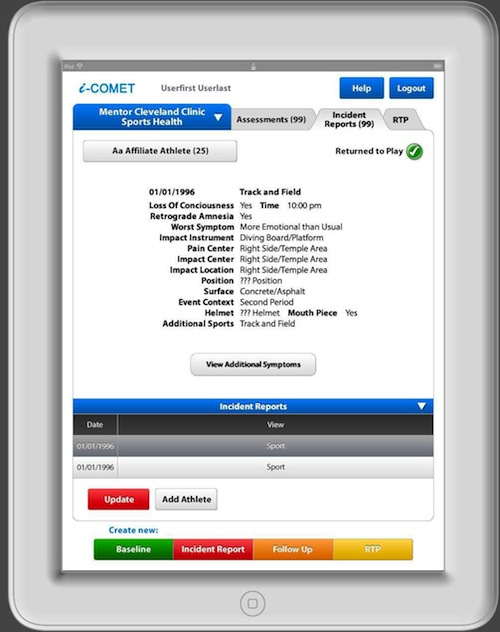 The Cleveland Clinic developed the Cleveland Clinic Concussion Assessment System (C3), a two-year-old iPad app that measures concussion severity and recovery, to "bring continuity of assessment across a large healthcare organization," according to biomedical engineer Jay Alberts. It now is showing promise as a way to maximize limited resources for treating head injuries in rural communities.
The Cleveland Clinic developed the Cleveland Clinic Concussion Assessment System (C3), a two-year-old iPad app that measures concussion severity and recovery, to "bring continuity of assessment across a large healthcare organization," according to biomedical engineer Jay Alberts. It now is showing promise as a way to maximize limited resources for treating head injuries in rural communities.
This month, researchers from the Cleveland Clinic Concussion Center brought the C3 app to Rock Valley Community High School in Rock Valley, Iowa, population 3,400, to conduct baseline screenings on student-athletes. Should any of the young athletes suffer a blow to the head, a coach or athletic trainer can run the iPad assessment to detect and evaluate concussion symptoms, then get the injured teen into treatment.
The app later can help local health professionals and school officials determine if it is safe to clear the athlete to return to competition. "It provides us a great opportunity for us to improve outcomes and care for folks who are not in major metropolitan areas," Alberts, director of the Cleveland Clinic Concussion Center, told MobiHealthNews.
Since Alberts, who grew up not far from Rock Valley, brought the app to the area, nearby communities have taken notice and want the app for their own high school athletes. "Other schools in Northwest Iowa have contacted us, and we're moving forward with logistics," Alberts said.
According to Alberts, the concussion center has tested C3 on more than 6,000 athletes at about 60 high schools and colleges in Northeast Ohio. To date, the app has helped physicians confirm about 500 actual concussions.
The C3 app captures data in four areas to quantify the extent of cognitive and motor impairment: information processing ability, attention/memory, balance and visual acuity. It also incorporates the Sports Concussion Assessment Tool (SCAT2), a globally recognized protocol for evaluating concussions.
Athletes actually strap an iPad onto their backs for the C3 test so the iPad's gyroscope and accelerometer can measure movements that might indicate concussion-related balance problems.
Alberts said C3 app evolved from another app he developed to help Cleveland Clinic physicians detect the tremors associated with Parkinson's disease. The concussion app distinguishes between cognitive problems and motor problems, and does it fast.
"We can gather these data points very quickly," Alberts said. "More people are being referred to physical therapy than before, and they're getting treatment faster," Alberts reported.
Though the iPad certainly supports video chats and the Cleveland Clinic has supplied the app to a school district several states away, C3 presently does not have a telemedicine element to call in a specialist if necessary. "But that's one of the things we're exploring," Alberts said.
Another long-term goal for the app and the concussion center is to to determine if widely accepted concussion protocols actually work, Alberts added.




















